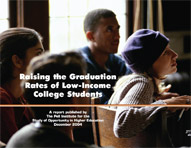Pell Institute report
Raising the Graduation Rates of Low-Income College Students
As a group, colleges that serve large percentages of low-income students have lower graduation rates than other colleges. However, among the colleges that serve low-income students there is also considerable variation in graduation rates, differences that suggest a strategy for studying and improving college outcomes.
This report presents the findings of a study designed by the Pell Institute for the Study of Opportunity in Higher Education to identify the institutional characteristics, practices, and policies that might account for differences in retention and graduation rates among colleges and universities that serve high concentrations of low-income students. The Lumina Foundation for Education supported the study in an effort to learn and share effective practices for fostering student success.
More Research
Support Us
If you are a student support services professional, thank you. You are an unsung hero for all the good that you do, and surely you know by now that COE has your back.
Partner
Through strategic collaborations, we work to strengthen quality, opportunity and access to education for all American students — the next generation of global leaders.
Join Us
Join more than 1,000 colleges and community agencies committed to postsecondary opportunity for low-income, first-generation students, students with disabilities in all 50 states, Washington, D.C., the Pacific Islands, and Puerto Rico!
